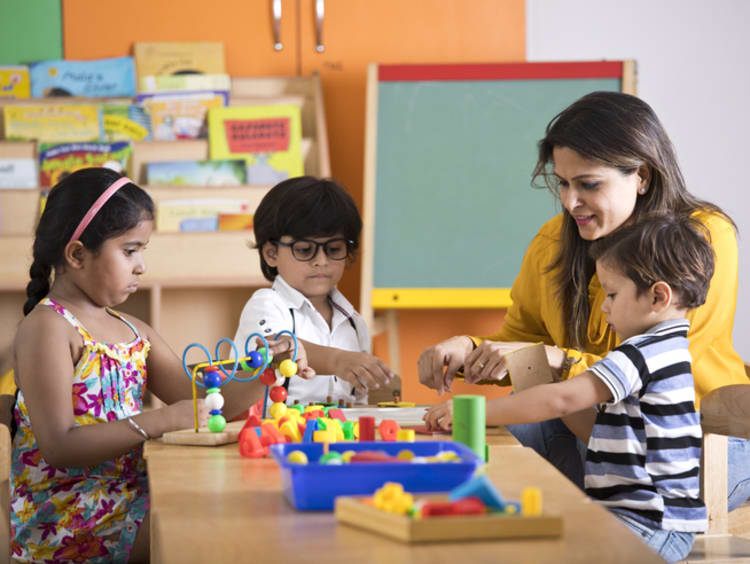In the early years of a child’s life, learning and development happen at a rapid pace. While academic learning is crucial, outdoor play is equally important in a preschooler’s growth. Outdoor play offers a wide range of benefits that help in physical, emotional, social, and cognitive development, shaping a child’s overall well-being. 7 Essential Benefits of Outdoor Play for Preschooler’s Growth & Development In this blog post, we’ll explore why outdoor play is essential for preschoolers and how it can help them thrive. 1. Physical Health Benefits of Outdoor Play Preschoolers are naturally full of energy, and outdoor play provides them with the perfect outlet. Running, jumping, climbing, and playing active games help to build strength, improve coordination, and develop fine and gross motor skills. Whether it’s riding a tricycle, playing tag, or swinging on a swing, these activities contribute significantly to muscle development and overall physical fitness. Combatting Sedentary Lifestyles Regular outdoor activities can help combat the sedentary lifestyle that is becoming more common due to the increase in screen time. Being outside encourages children to move and explore, which supports their cardiovascular health, improves bone density, and reduces the risk of childhood obesity. 2. Cognitive Development Through Outdoor Play Outdoor play fosters creativity and problem-solving skills. When preschoolers play outside, they often encounter natural elements like trees, rocks, and dirt. These experiences stimulate their curiosity, allowing them to engage with their environment in new and innovative ways. For example, a child may build a fort out of sticks, learn to navigate uneven terrain, or experiment with water or sand, all of which encourage imaginative play and creative thinking. Critical Thinking and Problem-Solving Additionally, outdoor activities help develop a child’s ability to plan, make decisions, and solve problems. Whether it’s figuring out how to climb a tree, deciding on roles in a group game, or finding a way to balance on a seesaw, outdoor play requires children to think critically and develop problem-solving skills that are valuable throughout life. 3. Social and Emotional Growth Through Outdoor Play Social Skills Development: Interacting with other children in an outdoor setting is an excellent opportunity for preschoolers to build social skills. Group activities like playing games, sharing toys, or building structures together promote teamwork, cooperation, and communication. Children learn to take turns, negotiate, and resolve conflicts in a natural and organic way when playing outside with their peers. Emotional Resilience and Confidence: Outdoor play also has positive effects on emotional development. It allows children to experience a range of emotions, such as excitement, joy, and even frustration, all of which contribute to emotional resilience. By encountering and navigating challenges outside, children learn to cope with failure and gain confidence in their abilities. Additionally, outdoor activities can provide a sense of independence, as preschoolers often feel more in control of their environment when they are allowed to explore and make decisions on their own. 4. Building a Connection with Nature Fostering Environmental Awareness: In today’s digital age, children often spend a considerable amount of time indoors. However, spending time outdoors fosters a strong connection with nature. Preschoolers who spend time exploring parks, gardens, or natural spaces gain a sense of appreciation for the environment. They learn about different plants, animals, and ecosystems, which promotes environmental awareness and responsibility. Mental Health Benefits of Nature: Moreover, outdoor play allows children to benefit from the mental health advantages of nature. Research has shown that spending time in green spaces can reduce stress, improve mood, and increase focus. These benefits help preschoolers feel more calm, centered, and connected to the world around them, contributing to their overall well-being. 5. Enhancing Sensory Skills Through Outdoor Exploration Outdoor environments are rich in sensory experiences that are vital for a preschooler’s development. The natural world offers an array of sights, sounds, smells, and textures that cannot be replicated indoors. For example, children can feel the rough bark of a tree, listen to the chirping of birds, observe the movement of leaves in the wind, and smell the fragrance of flowers. These sensory experiences enhance their ability to process sensory information and improve sensory integration skills. Comprehensive Sensory Development Exploring the outdoors allows preschoolers to practice all five senses, helping them to build stronger connections between what they see, hear, touch, taste, and smell. Sensory play is crucial for brain development and plays an important role in early learning. 6. Improving Attention and Focus Reducing Mental Fatigue: In a world filled with distractions, children’s ability to focus and pay attention is often challenged. However, studies suggest that outdoor play can help improve a child’s attention span and concentration. Spending time in nature or engaging in physical activity can help preschoolers relax and reset, enabling them to return to their indoor activities with better focus. Boosting Cognitive Function: Outdoor play, especially in unstructured settings, helps children develop the ability to focus on tasks, whether it’s completing a puzzle, drawing, or building a sandcastle. Nature’s calming effect helps reduce feelings of anxiety, which can otherwise hinder a child’s ability to focus and engage with tasks. 7. Encouraging Risk-Taking and Confidence Building Outdoor environments provide natural opportunities for preschoolers to engage in calculated risk-taking, which is essential for their development. Climbing a tree, jumping from a height, or balancing on a log might seem risky, but these activities teach children to assess situations, make decisions, and overcome their fears. When preschoolers successfully complete a challenge, they gain confidence in their abilities, fostering a positive sense of self-esteem. Resilience Through Challenge: Learning to manage risk in a safe and supportive environment helps build resilience, perseverance, and a “can-do” attitude—skills that will serve them well throughout their lives. Preschool Admissions are now open for the 2025-26 Academic Session!! Enroll Your Kid Now Conclusion Outdoor play is much more than just fun for preschoolers; it is a critical aspect of their growth and development. From physical health benefits to cognitive, emotional, and social development, outdoor play offers endless opportunities for children to explore, learn, and grow.


